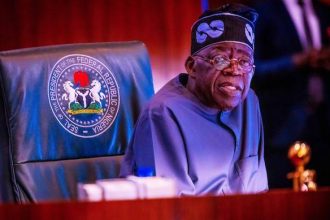 |
| President Muhammadu Buhari receiving the goals of the economic Sustainability Plan from the vice president Yemi Osibanjo. |
The federal government of Nigeria introduced several programmes to help reduced the negative effects of COVID-19 on Households and Micro, Small and Medium Enterprises (MSMEs) which the government believed could save the country’s economy.
(adsbygoogle = window.adsbygoogle || []).push({}); Several intervention programmes were introduced by the Professor Yemi Osibanjo’s lead Economic Sustainability Plan (ESP) to support vulnerable Nigerians and MSMEs which Osibanjo believed it is the backbone of every economy. Among these programs includes;
Anchor Borrower Programme (ABP)
In 2016, this was four years before the pandemic, the Federal Government through the Central Bank of Nigeria (CBN) rolled out the “Anchor Borrower Programme (ABP)”.
This Programme was aimed at supporting small holder farmers (peasant farmers) with Small Loans and farming inputs like seedlings, fertilizer, herbicides and pesticides for the control of various pests from destroying grains.
READ ALSO: CBN set to begin the disbursement of Nexit loans to 300,000 N-POWER beneficiaries
(adsbygoogle = window.adsbygoogle || []).push({}); Under the Anchor Borrower Programme, a farmer cultivating one hectare of land was given N200,000. That is, a hectare was valuated at the cost of N200,000 with inputs inclusive.
Agriculture For Food and Jobs Plan (AFJP)
In 2020, the Federal Ministry of Agriculture and Rural Development (FMARD) launched the Agriculture For Food and Jobs Plan (AFJP) to help peasant farmers get 0% interest loans for farming purposes.
This initiative of the Federal Government most times referred to as FMARDpace had a beneficiary target of two million farmers Nationwide. N-POWER beneficiaries from batch A and B were trained and sent to all the council wards in the country to capture farmers and their farms. This captured data according to the ministry would help have a complete data of farmers across the country.
(adsbygoogle = window.adsbygoogle || []).push({}); On the 16th of June 2021, the Brazilian Government partnered with the Federal Ministry of Agriculture and Rural Development (FMARD) and also gave the sum of €995 million to help the ministry achieve it’s goal in the farming sector of the economy.
READ ALSO: FG begin the distribution of dry season farming inputs under the Anchor Borrower Programme
In September 2021, the ministry through SANEF fetched account numbers of about 800,000 farmers and paid in between N3,000 to N28,000 and later stopped the disbursement to open new accounts for the captured farmers with GTB. The programme is believed to be implemented properly this year.
COVID-19 Targeted Credit Facility (TCF)
In March of 2020, during the lockdown, the Federal Government through the Central Bank of Nigeria (CBN) rolled out what became the most benefitted Government programmes in the present administration.
The programme was aimed at reducing the negative effects of COVID-19 on Households and Micro, Small and Medium Enterprises (MSMEs).
The CBN said, any person affected by the pandemic in one way or the other can apply and if successfully reviewed and approved will be given the approved amount. Though one could apply for the maximum Household limit of N3m he or she may be approved less than the amount, approval was based on cash-flow in the applicants bank account.
(adsbygoogle = window.adsbygoogle || []).push({}); More than half a million households and MSMEs befitted and are still benefitting from the programme. NIRSAL Microfinance Bank (NMFB) which CBN named to handle the programme said the programme will end this year 2022.
National Youths Investment Fund (NYIF)
In September of the same year 2020, the Federal Government through the Ministry of Youths and Sports Development (FMYSD) rolled out the National Youths Investment Fund which many believed is the worst programme in the Buhari administration.
READ ALSO: FG created 750,000 jobs for Youths under Buhari’s administration alone
The programme which is aimed at assisting the Nigerian Youths’ innovations with soft loans between N250,000 to N3,000,000. In the first phase of its disbursement, only a handful of Youths actually benefitted from the programme. This initiative is to be rounded up this year as well.
Survival Fund
Another Programme of the Federal Government that was successfully implemented is the Survival Fund. This is another Programme from the Economic Sustainability Plan (ESP) headed by the Vice President, Prof. Yemi Osibanjo and implemented by the Steering Committee Chaired by the Honourable Minister of State for Industry Trade and Investment Amb. Mrs. Miriam Katagum.
(adsbygoogle = window.adsbygoogle || []).push({}); During the COVID-19 lockdown, many businesses were negatively affected, most especially those selling perishables. It was in view of this that the Federal Economic Council through the Economic Sustainability Plan (ESP) rolled out the Survival Fund.
Under this Programme, employees of private sector businesses were paid monthly salaries of at most ten employees between N30,000 to N50,000. This initiative of the Federal Government saw the light of the day as many businesses and individuals benefitted from it. Though about 33,000 verified beneficiaries are yet to receive the stimulus.
The Steering Committee in January this year, during the first meeting of the Federal Economic Council assured unpaid beneficiaries that verified beneficiaries will be paid this year.
Trader, Market and Farmer Moni
In 2017, The Federal Economic Council (FEC) Chaired by the Vice President, Yemi Osibanjo brought out the Trader, Market and Farmer Moni to assist small traders with small loans between N10,000 to N300,000.
(adsbygoogle = window.adsbygoogle || []).push({}); Under Trader Moni, small loans of N10,000 was given to peti-traders through the Bank of Industry (BOI). Beneficiaries were expected to repay the loans within six months of disbursement.
Under Market Moni, peti-traders and artisans received soft loans of N50,000 which were mandated to pay back in six months time as well.
Under Farmer Moni, peasant farmers received N300,000 to invest in crops cultivation and repay after harvest. The programme is still ongoing but expected to end this year.
(adsbygoogle = window.adsbygoogle || []).push({});












